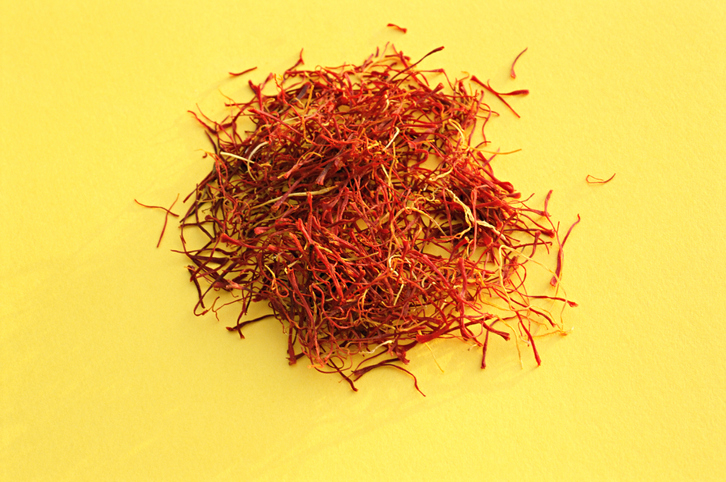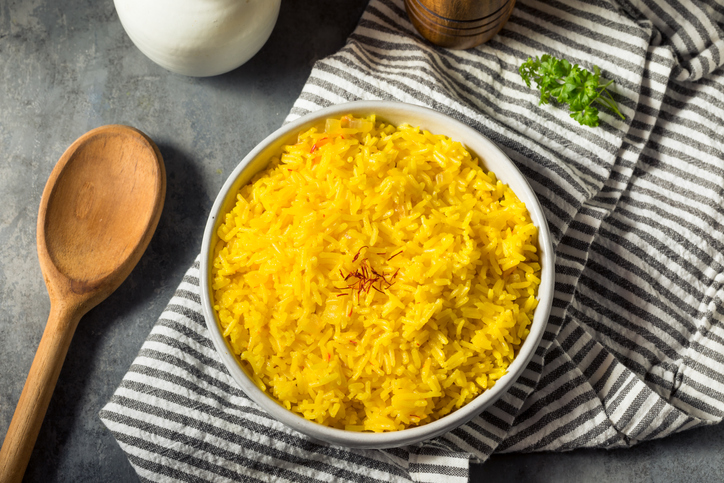Is Saffron the ‘Antidepressant’ We Didn’t Know We Needed?

By Joy Stephenson-Laws, JD, Founder
Saffron, the spice that gives paella its beautiful, golden color, is the most expensive spice in the world!
It actually takes 75,000 saffron flowers (the flowers are actually a beautiful vibrant purple) to make just one pound of the saffron spice! Luckily, a little goes a long way when cooking with this spice.

Although saffron may be costly, its potential health benefits, specifically in regards to the brain, may make it priceless. There has been an extensive amount of research on this, and saffron is commonly called a neuroprotective agent.
“Clinically, Saffron has shown both safety and efficacy in mild to moderate Alzheimer's disease. Saffron has the neuroprotective activity because of its chemical active moieties,” according to a report from ScienceDirect.
“Saffron's efficacy has been examined in some brain diseases such as Alzheimer's disease, Parkinson's disease, cerebral ischemia, and depression because of its chemically active moieties.”
Saffron may help with depression
I am a firm believer that diet and depression are extremely connected. Studies have shown that a processed foods diet, which produces inflammation, is a major contributor to the development of depression and experiencing depressive symptoms.
- Nutritional Help to Fight Depression in Women
- Is Your Diet Damaging Your Brain?
- The Real ‘Happy Meal’ May Be Fruits and Vegetables
- Your Diet May Be Why You’re Depressed
The good news is that there are plenty of whole, nutrient-dense foods, many of which are anti-inflammatory, that have been shown to fight depression. Studies have shown that saffron may be one of them. There have been multiple studies where researchers compared the use of saffron to clinical antidepressants.
In one study, discussed by the National Institutes of Health (NIH), researchers compared saffron with fluoxetine, a medication used to treat major depressive disorder, obsessive compulsive disorder (OCD), panic disorder and more. In a study that lasted six weeks, researchers looked at the “therapeutic effects on depression.” The results showed that saffron had a comparable therapeutic effect in treating mild to moderate depression as fluoxetine did.
Furthermore, “A double-blind, randomized clinical trial found that, after receiving saffron (15 mg capsule, b.i.d.) or fluoxetine (20 mg capsule, b.i.d.), nearly 50% of the patients in both groups experienced an improvement of depressive symptoms and a reduction in depression scores.”
In another study, saffron’s effects on depression were compared to another clinical antidepressant called imipramine. Similar results were found where saffron was very comparable to the use of imipramine.
An article published by Neuroscience News discusses a study which found evidence suggesting that saffron complements antidepressant medications.
“Dr. Lopresti [lead on the study] said that the study indicated that saffron could be used as a natural supplement given at the beginning of antidepressant treatment to increase its effectiveness and to possibly reduce potential adverse effects which are sometimes experienced when one is prescribed antidepressants.”
Always consult a competent medical professional.I think these are all very positive findings, however, this does not mean that you should quit taking your antidepressant if you are currently on one per the advice of your doctor. This also does not mean that you should not consider taking antidepressants and talk to your doctor if you believe you are suffering from depression and need relief. What this means is that saffron may be an alternative form of therapy, depending on the type of depression you have, and it may complement a medication you may be already taking. Saffron may also not cause as many side effects as a clinical drug.
Whatever the case, speak with your doctor and a competent mental healthcare professional. Also know that there are many saffron supplements out there that may not be of the best quality or even be effective. You also do not want to cause a drug interaction or supplement overdose by improperly taking a saffron supplement.
Even if you do not have depression or a mental illness, incorporating saffron into your diet may be beneficial to your overall health. Saffron has powerful antioxidant properties, and several sources report that it may help with heart and eye health, sexual dysfunction and even help fight cancer. If you are cooking with saffron, be sure to buy the threads instead of the powder. With the threads, you are more likely to get true, quality saffron.

Sometimes cooking with saffron can feel intimidating. Paella is not an easy dish, and as mentioned saffron is not cheap. Perhaps try just a simple saffron rice or talk to your doctor about incorporating saffron tea into your diet.
As always, consult a competent healthcare professional if you are pregnant or breastfeeding when it comes to incorporating new foods, supplements and teas into your diet. Note too that even though saffron has exhibited powerful neuroprotective effects, some sources claim that it may trigger mood swings in people who have bipolar disorder. This is why, again, always consult a healthcare professional.
Enjoy your healthy life!
Disclaimer: This article is not intended to provide medical advice. Please consult with your doctor or another competent healthcare practitioner to get specific medical advice for your situation.
The pH professional health care team includes recognized experts from a variety of health care and related disciplines, including physicians, attorneys, nutritionists, nurses, and certified fitness instructors. This team also includes the members of the pH Medical Advisory Board, which constantly monitors all pH programs, products, and services. To learn more about the pH Medical Advisory Board, click here.







